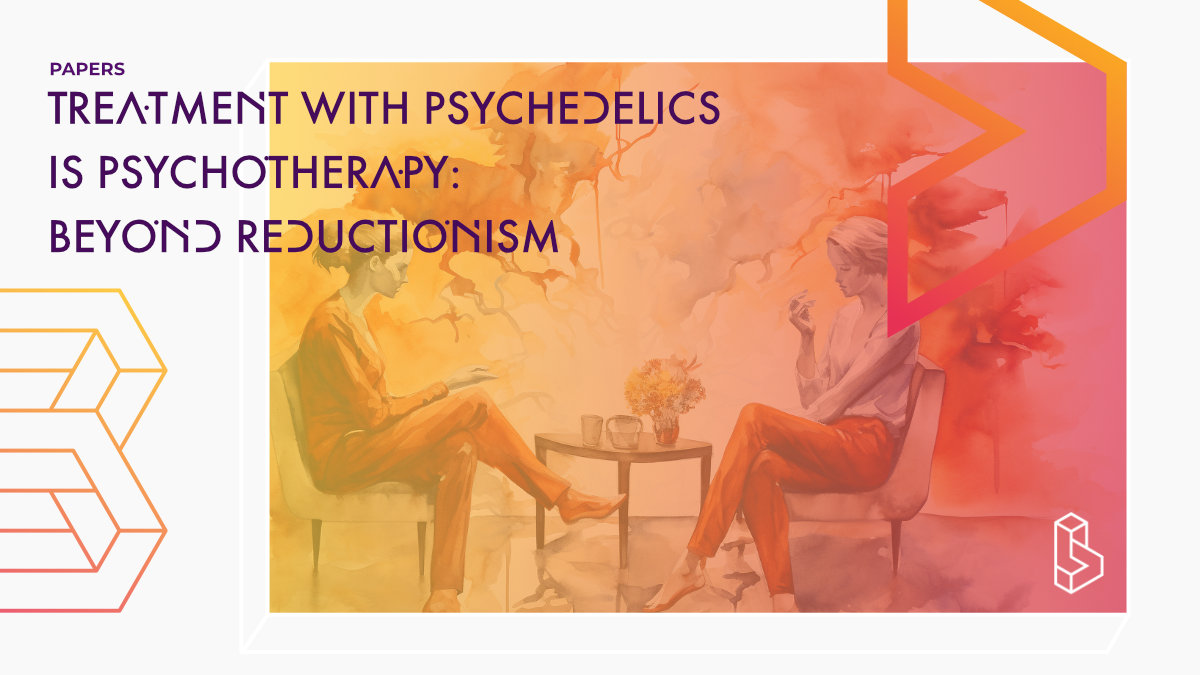This opinion piece (2023) challenges the traditional conceptualization of psychedelic-assisted psychotherapy (PAP/PAT), emphasizing that the therapeutic effects of psychedelics should not be solely attributed to the substance itself but also to the importance of psychotherapy. The authors argue against reducing the role of psychotherapy to mere psychological support for safety, advocating for a more integrated approach to understanding and studying the therapeutic potential of psychedelics in treating psychiatric disorders.
Abstract of Treatment with psychedelics is psychotherapy: beyond reductionism
“Treatment of psychiatric disorders with psychedelic substances represents one of the most promising current treatment approaches in psychiatry. Since its inception in the 1950s, therapy with psychedelics has been conceptualised as psychedelic-assisted psychotherapy—ie, a form of psychotherapy that uses the profound biological effects of this class of substances as a catalyst for changing thinking, emotions, and behaviour. In this view, the psychotherapy component of the treatment is considered as being of the utmost importance for both the safety and efficacy of the therapy. This conceptualisation has been challenged by the idea that the latest clinical studies suggest that the potential therapeutic effects of psychedelics must be attributed solely to the substance itself, with no role for psychotherapy. Here, accompaniment by therapists is understood as mere psychological support, to maintain the safety of the substance administration. In this Personal View, we contrast these two views and argue that the characterisation of treatment with psychedelics as a biological intervention (with psychological support as a purely safety-related component) represents an outdated and reductionistic dualism that has dominated psychiatric treatment and research for far too long. This discussion has important implications for the study and the regulation of these compounds.”
Authors: Gerhard Gründer, Manuela Brand, Lea J. Mertens, Henrik Jungaberle, Laura Kärtner, Dennis J. Scharf, Moritz Spangemacher & Max Wolff
Summary of Treatment with psychedelics is psychotherapy: beyond reductionism
The debate over whether treatment with psychotropic drugs or psychotherapy is more effective in treating psychiatric disorders has divided the opinions of those within the discipline. The debate is becoming highly topical again, since the effects of treatment with psychedelics are traditionally closely intertwined with the effects of the environment. The effects of any psychotropic drug are always context-dependent and cannot be controlled by adding a placebo group to an experimental setup. In this Personal View, the authors discuss why researchers, clinicians, and the whole psychiatric discipline should stop thinking in this reductionist, dualistic way.
Find this paper
Treatment with psychedelics is psychotherapy: beyond reductionism
https://doi.org/10.1016/S2215-0366(23)00363-2
Paywall | Google Scholar | Backup | 🕊
Cite this paper (APA)
Gründer, G., Brand, M., Mertens, L. J., Jungaberle, H., Kärtner, L., Scharf, D. J., Spangemacher, M., & Wolff, M. (2023). Treatment with psychedelics is psychotherapy: Beyond reductionism. The Lancet Psychiatry. https://doi.org/10.1016/S2215-0366(23)00363-2
Study details
Authors
Authors associated with this publication with profiles on Blossom
Max WolffDr Max Wolff is a psychedelic researcher from Germany. He's the Head of Psychotherapy Training & Research at the MIND Foundation in Berlin.

